The Apple Update cycle
Seeing recent news on Apple slowing work on next OS versions to bug fix current OS. Even better, slow release cycle of everything. Do we really need new iPhones every 12 months? New OS every 12 months?
We can recalibrate expectations for new stuff. Slow down. Shift priorities.
Israeli American scholar Omer Bartov, a leading expert on the Holocaust, says Israel’s brutal assault on the Gaza Strip is at risk of becoming a genocide. The monthlong war has killed more than 11,000 Palestinians, a majority of them women and children. Israel has also severely limited the movement of food, water, fuel, medicine and other essentials into Gaza.
Authorities in a number of European states have banned Palestinian solidarity protests and harassed and arrested people for expressing — in public and online — support for Palestinians' rights.
Some governments have threatened to shutter organisations and groups that advocate for human rights for Palestinians…
Such fear-mongering has a logical outcome: people will be reluctant to stand up for the human rights of Palestinians and Muslims. In the midst of all that fear and uncertainty, better to say nothing at all.
Peaceful Israel/Gaza protests are not ‘national security’ threat
Went to town yesterday for groceries and put 3 gallons of gas in the car. That's my second purchase of gas this year. I put about 3.5 gallons in it on February 28. So, 6.5 gallons for the year. It's not zero but it's not too bad.
"Something horrible is happening to these people, and this administration is turning a blind eye to it," says James Zogby, the institute's president. "There are going to be electoral consequences."
Arab American Support for Biden Plummets over Gaza Ahead of 2024 Election - YouTube
New keyboard day. The iClever is thin and light, it folds in the middle with a split layout that takes a bit of getting used to but after an afternoon it’s feeling pretty good.
Each side is angled outward a bit which aligns better with the positioning of arms and hands placed in front of a person. 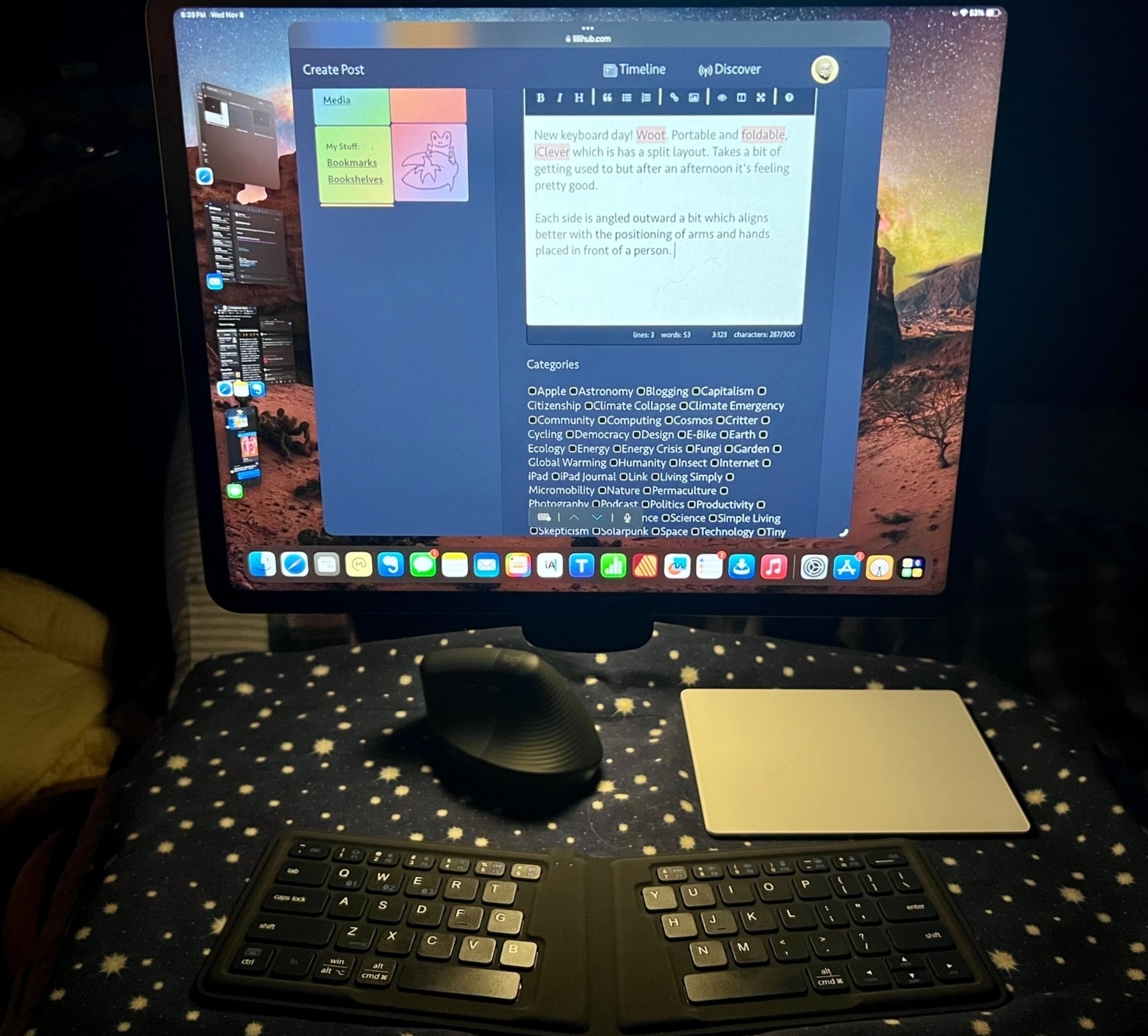
Metabolic change is a less-talked-about, yet brutal and widespread, consequence of global warming. As ocean temperatures rise, so do the metabolisms of animals from fish to crustaceans to zooplankton. They need more food, and it isn’t always available, which is what appears to have contributed to the snow crabs’ population collapse.
One of those little details that the wealthiest 10% of the planet can’t be bothered to think about as they go about the business of burning up the planet and apparently forgetting that this is home.
The Hidden, Awful Way That Climate Change Imperils Animals | WIRED
This morning I shared a post about the importance of the US and its citizens taking full responsibility for the genocide happening in Gaza right now. In response Tuban_muzuru on Mastodon asked: "Perhaps you have some ideas what we as ordinary Americans might do. "
Perhaps you have some ideas what we as ordinary Americans might do. Washington DC has become a congregation of whores.
I suspect the smart move is to take all that wonderful advice we're given, up stakes and leave the outside world to its fate. If the last Serb chases the last Croat through those hills, if the Russians recolonise Ukraine, if the Strong Men oppress the weak - why on earth should we care?
There is no quick fix to the host of problems we have before us. No one-size-fits-all prescription. The problem in the US is decades in the making as are many of our global problems. And of course such problems are never just political. The various crises of our time span borders, cultures, economies and ecosystems. But for the moment I'll be writing specifically as a US citizen, focused on my experiences and observations here.
As the problems are not just political, the solutions cannot just be protests or voting which are the two choices people most often think of first when they think of fixing problems. The solutions are not necessarily new laws or new legislators or even new parties. The solutions are long term, deep changes to culture, political process, media, economics, education and on. Democracy should run deep and it should more deeply define us. Of course I say all this knowing that many of our planetary problems have reached the level of emergency or crisis and require swift action. The same too could be said of wars that are happening right now.
What to do? What is the action to be taken?
It's long, long past the time that Americans stop yelling at and past one another. We don't change or build anything with that. It's just venting rather than communicating. If we want to re-engage any kind of meaningful democratic process we have prioritize meaningful communication and discussion of problems as well as possible solutions. To do that we'll need spaces. Local, face-to-face space as well as spaces online. Where do we go to learn and practice democracy? Historically it was the town square, street corners, newspapers, shops, schools, parks, libraries all served as a patchwork of public life. It's easy to see that in 2023 many of those spaces no longer exist as they once did. We've spent 80 years building roadways, strip malls and suburbs, all around fast, private transport via the automobile. Our community spaces have been replaced by highways and shopping centers populated by big box stores so that's going to be an obstacle, especially in suburbia.
I live in a small town and we have a library that can serve as a public space for speaker events, classes and workshops. We also have several parks, at least one in the middle of town that has several covered pavilions. I suspect many small towns have spaces like that and many urban areas too.
Let's assume that, to some degree, people can find spaces in their communities to make face-to-face gatherings happen. What can be accomplished at such gatherings and what do they look like?
My suggestion is that we begin by simply creating small local events that can take on a variety of forms: potlucks, workshops, teach-ins, study groups and speaker events can be held by small groups of friends and neighbors or larger if space is available. There's nothing new about this suggestion and such gatherings already happen in some communities. They can be organized by individuals, friends, organizations that have shared concerns and might take place weekly, monthly or at any schedule at all as needed.
In my own experience I've been a part of numerous weekly study groups where participants, week-to-week read and discuss books, essays, articles, topics/ideas and so on. The possibilities are limitless but what's most needed is for people to begin getting together, to take the initiative to educate themselves and one another on issues. To move forward citizens in a democracy have to be proactive in being better informed about the important problems of their community at a variety of scales. Such community initiatives and processes have been lacking in American life for decades.
Consider that commonly the American Dream is also described as "The Rat Race". That's quite a different version of life here. But both apply. A successful life is often characterized by a good job, good money, nice car, nice home filled with stuff. In other words: work and consumption. Days are filled with commuting and working. Nights are squeezing in food, entertainment, household chores and then sleep before repeating the same again. And weekends are spent alternating between recovery, entertainment, more chores, etc. But no where in this cycle do people set aside time to get together as citizens. I can hear people laughing at the suggestion. "You want me to use my precious time away from my job and commute to read about US foreign policy in the Middle East? You want me to go to a county or town council meeting? You think I'm going to spend a few evenings this month so that I can organize a workshop at the library three Saturdays from now? That's a waste of my evenings and a Saturday!
But we need to ask ourselves, what is this "democracy" thing we pretend to value? What is its substance? We cry and complain that "government is corrupt" and it is. It's been taken over by monied interests. That happened years ago. We don't like it and yet we refuse to do anything about it. We refuse to take even a little responsibility. We refuse to even think what our role as "We the people" IS.
And then, when crises happen we don't know what to do. Why is the world on fire? I'll just scroll my Instagram feed. Genocide being perpetrated with MY tax dollars? Huh, I wonder what's on Prime Video tonight. We brush off our responsibilities. We make excuses about how this or that is too complex to understand. It's much easier to just watch a video.
So, I'd characterize much of the above as community education. Taking a proactive role in better understanding what's happening and why it's happening. Learning and teaching ourselves and one another. And in that understanding, also, as communities, thinking more about what it is we actually want. If democracy is the process by which we manage our lives, a part of that never-ending-discussion is its expression in real-world actions, organizations and material projects.
WE have to do more than vote. Back in the early 1900s the more militant labor unions, exemplified by the Wobblies of the IWW, were known for phrases like "Don't mourn, organize!" They held firmly to the idea that the world could be made better by working people when they were willing to stand up together and help one another through direct action on the job, and in their communities. Sometimes that direct action took the form of education efforts. Sometimes it took on the form of striking or strike support. It might be taking the time to protest or cook meals for those in the middle of struggles. It was mutual aid and solidarity. Many gave their whole lives to these efforts and it's a part of our history we would do well to reacquaint ourselves with.
What can we do to build the world we want? While steps of building community-based spaces and processes for communication and discussion are critical, they are just the beginning of an ongoing process. But I would suggest that local community building is important to all of our solutions. Communication and discussion, as a part of local democracy can't really be separated out from the other work that will grow out of meeting the needs of people. They'll remain intertwined.
But let's get onto action items. We want action, we need action. (Note: At the end of a long day I'm about to post this knowing I'd like to add more detail to this section. I hope to do that and repost at a future date).
- As stated above, we need to immediately get busy creating educational gatherings, workshops, study groups, local, community media
Community building - mutual aid
- Local structures of mutual aid would also be primary. If people's needs are not being met, what are some of the most essential needs that can be met via volunteer labor and at low cost?
- Makerspaces, tool libraries, re-use co-ops
- Services
Community building - local governance
- Building local democracy. Really, this is just a placeholder for something I'm not ready to write about here.
Immediate Response - Global crises
Day-to-day, the two crises that most have my attention at the moment are the climate crisis and the current genocide being carried out by Israel.
- The climate crisis is one that has guided my life. While it is immediate it's also been decades in the making and something I've been thinking about daily for 20+ years. This is the long emergency that will redefine the future of life on the planet.
- The crisis in the Middle East, also decades in the making, is perhaps more immediate in terms of the overt violence that is being leveled against a population of civilians. Thus far the most easy to observe actions being taken in response include:
- Organized local, individual and group efforts to call, meet with, pressure government representatives.
- Protests in the streets, occupations.
As it pertains to crises such as these it should be assumed that "our representatives" do not, in fact, represent us. With that assumption, it will be no surprise that they will not be immediately responsive to our opinions, calls or demands. We should be prepared for long-term protest similar to those seen with Occupy Wall Street in 2011.
It's time that US citizens remember the general strike as an action. The changes we need will absolutely require mass disturbance and disruption of business as usual. Citizens should get comfortable with not being comfortable. Shutting down the normal operation of cities should be become the norm. If these things seem too radical then I'd suggest people do not understand the foundational, systemic problems.
I expect that most "mainstream" Americans will show little to no interest in any of the above until the chickens come home to roost. The problem with our apathetic culture is that, well, it doesn't want to be disturbed or bothered. Americans have proven themselves to be not just unconcerned but deeply disconnected from reality until it affects them directly. While it seems that there is increasing concern of the various crises that just won't go away on their own, most notably the climate crisis, most are not concerned enough yet to actually commit to anything of substance. Sure they'll switch to EVs as those become more available and affordable but ask them to commit to rail and cycling and you might as well be making the request of a fence post.
And the current genocide against the Palestinians, which is in part the result of US foreign policy, well, that's half a world away. It's easy to just "be confused because it's so complex" and walk away. Sadly, tragically, many won't acknowledge their complicity as tax payers that just quietly go along. History repeats itself.
This genocide is yours too Americans. We need to own it. And not just this moment but the past decades leading up to it. That’s critical. Stop, take a long, deep breath. Look in the mirror and own it.
In general it seems US citizens are ignorant of how their tax dollars are put to work around the world. And, not just ignorant but uninterested. There’s a fundamental disconnect and lack of concern that the US supports violence with its foreign policy on a regular basis.
Even now, as genocide is being carried out with their tax dollars, most seem to just shrug in their comfort and allow themselves to be puzzled, making no real effort to understand.
We are so casual about violence and so ignorant of our foreign policy and practices. This genocide being carried out by Israel is also being carried out by the United States. It’s our genocide because Israeli conduct is rooted in the long historical and ongoing support of the United States.
This is our genocide too.
Tens of thousands marched from Washington, D.C.'s Freedom Plaza to the White House Saturday in the largest pro-Palestinian demonstration in U.S. history. Democracy Now!'s' Messiah Rhodes, María Taracena and Hany Massoud spoke to protesters who condemned the U.S. government's support for Israel and called for a ceasefire in Gaza. We also play excerpts from speakers at the protest rally, including lawyer Noura Erakat, musician Macklemore and writer Mohammed El-Kurd.
Voices from Largest Pro-Palestinian Protest in U.S. History: Stop the Siege on Gaza Now! - YouTube
The UN chief tells reporters Gaza is “becoming a graveyard for children. Hundreds of girls and boys are reportedly being killed and injured every day... More journalists have reportedly been killed over a four-week period than in any conflict in at least three decades... More United Nations aid workers have been killed than in any comparable period in the history of our organisation... I joined the UN family in mourning 89 of our UNRWA colleagues who have been killed in Gaza, many of them together with members of their family.”
UN chief: ‘Gaza is becoming a graveyard for children’ - YouTube
"Should we assume that Hansen and his team of researchers are right, and therefore take the drastic actions that are indicated? Or should we trust that mainstream moderate scientists like Michael Mann are correct, and calmly adopt a more gradual approach? Which choice represents the greatest risk? I think the answer is obvious." - Bread and Circuses at Climate Justice Social
"I imagine one of the reasons people cling to their hates so stubbornly is because they sense, once hate is gone, they will be forced to deal with pain." — James Baldwin
The best government money can buy. It’s a bit bonkers that anyone still considers the US to be any kind of democracy. It’s not.
Fossil fuel companies have spent millions of dollars on lobbying and campaign donations to state lawmakers who sponsored anti-protest laws—which now shield about 60 percent of US gas and oil operations from protest and civil disobedience, according to a new report from Greenpeace USA.
Eighteen states, including Montana, Ohio, Georgia, Louisiana, West Virginia, and the Dakotas, have enacted sweeping anti-protest laws which boost penalties for trespass near so-called critical infrastructure, that make it far riskier for communities to oppose pipelines and other fossil fuel projects that threaten their land, water and the global climate.
Study: Fossil Fuel Industry Is Behind a Spate of Anti-Protest Bills – Mother Jones
I love Micro.blog but I’ve come to resent how broken search and discovery is here.
BROKEN.
Can we please, please, please get some improvements here.
PLEASE.
I would love to be able to add to my current follows but by design it is made difficult.
PLEASE FIX THIS.
War crimes and genocide. My disgust deepens with each day.
Gaza’s largest refugee camp has been bombed again, the third major attack on the site in the past week. This time, Israel struck a UN-run school within the Jabalia camp where thousands of displaced Palestinians had been sheltering.
Israel bombs UN school in third major attack on Gaza’s Jabalia refugee camp | Al Jazeera
Most of those I follow have been very quiet on this. Complex or not, US tax dollars support Israel. If this is genocide and you’ve remained silent, consider that.
The “G” word – genocide – “can be used recklessly, carelessly, insensitively, as an emotional shutting of the gates, rather than an opening to an important conversation,” Mehdi says. But it’s a conversation we need, given the rhetoric from Hamas & Israeli officials.
The G Word: Mehdi examines accusations of genocide against Israel & Hamas - YouTube
Solidarity.
I woke up this morning thinking about the word solidarity. There was the time of my life when I thought about it every single day. A kind of daily meditation.
An awareness of shared interests, objectives, standards, and sympathies creating a psychological sense of unity of groups or classes…
It refers to the ties in a society that bind people together as one.
I long for a world where humans care for one another regardless of their differences. And where humans care for their planet as a whole.
Planetary solidarity.
Israel is actively committing the crime of genocide. The evidence is clear: Israel has taken diverse methods to ensure “the destruction of the essential foundations of the life” of Palestinians. These actions include the 16-year-long siege on Gaza. They have cut off food, water, fuel, and electricity, denied access to healthcare, ordered 1.1 million people out of their homes, bombed evacuation routes, and even bombed and targeted hospitals, churches, mosques, and health workers. Incitement to genocide is also punishable under the Genocide Convention. Israeli officials have openly called for the annihilation of the captive population.
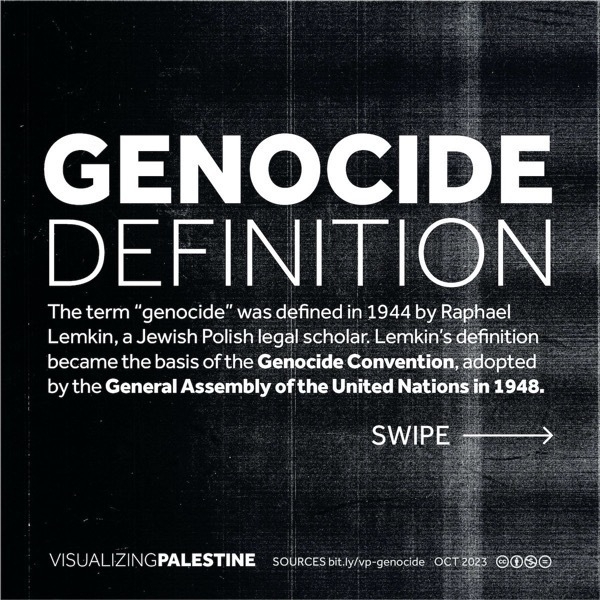
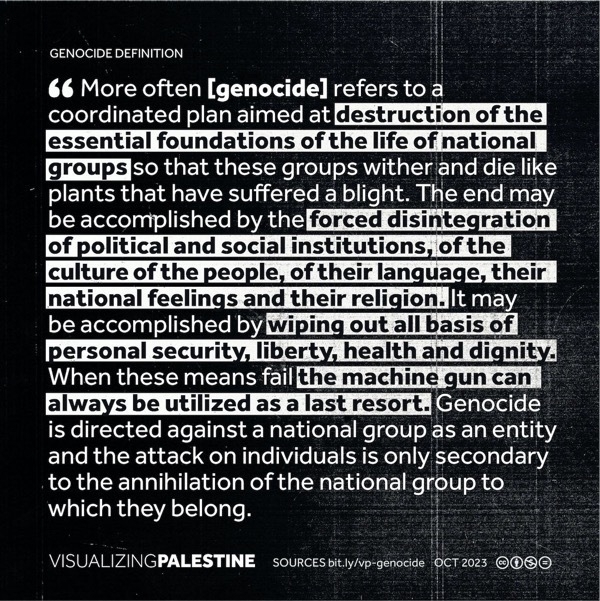
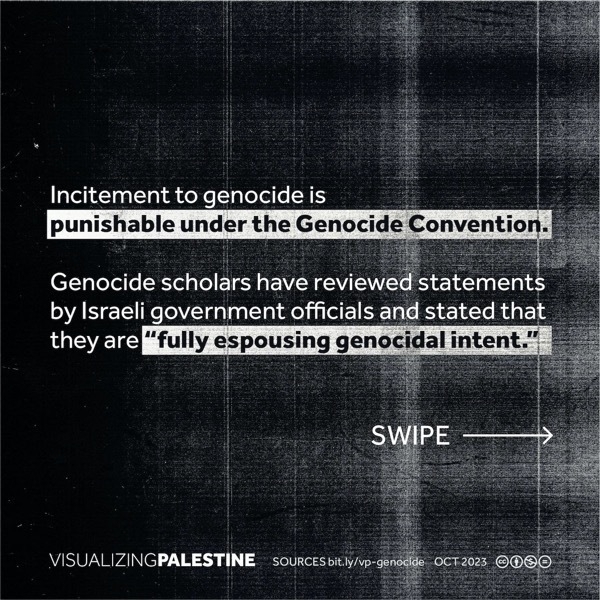
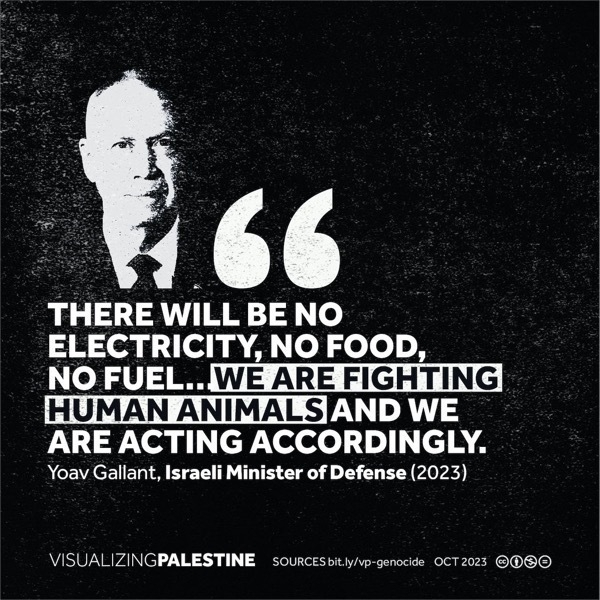
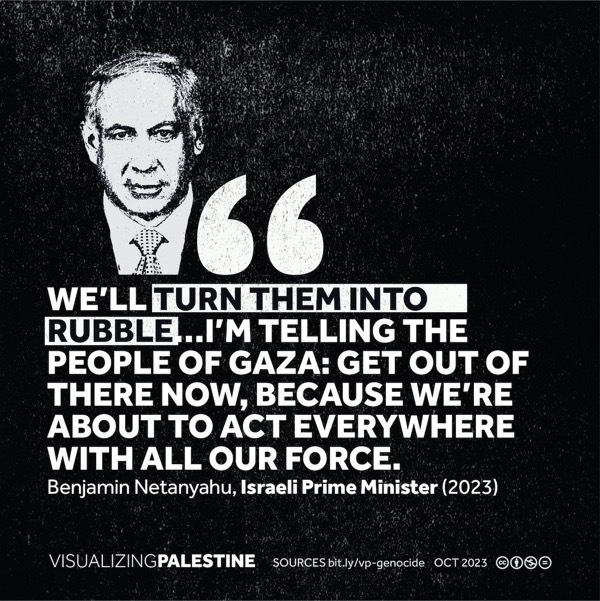

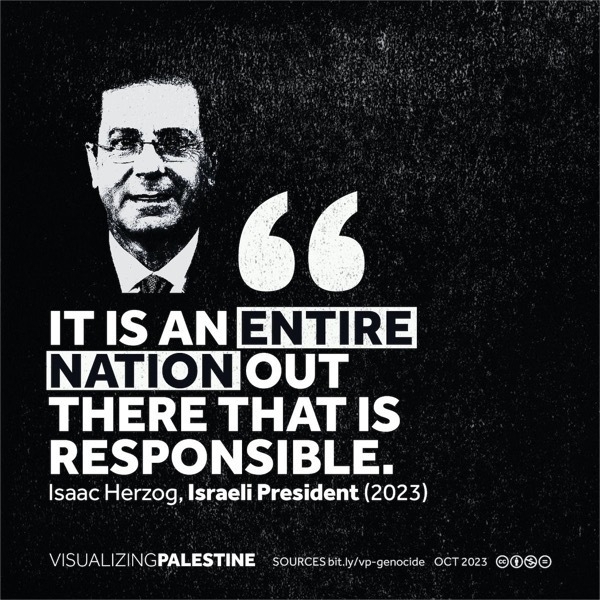
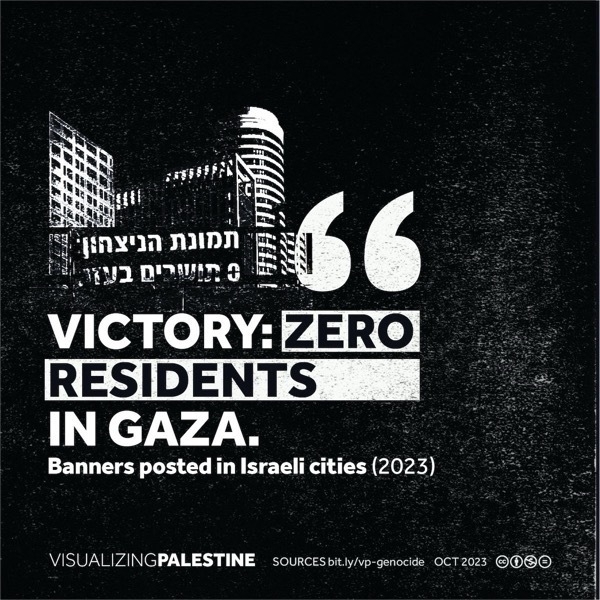
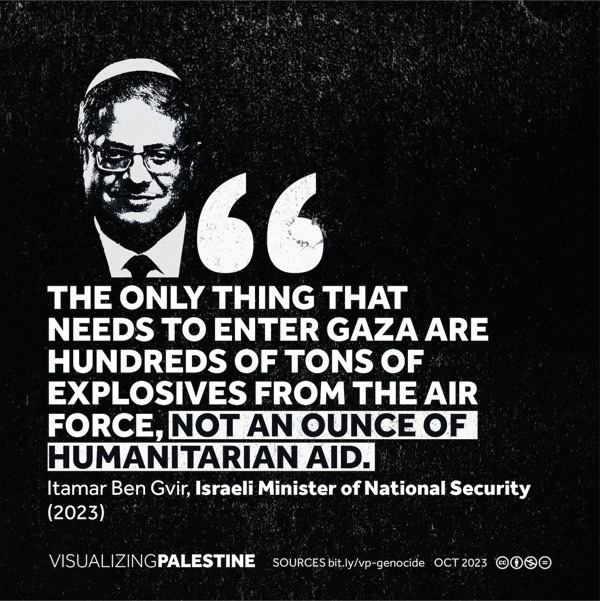
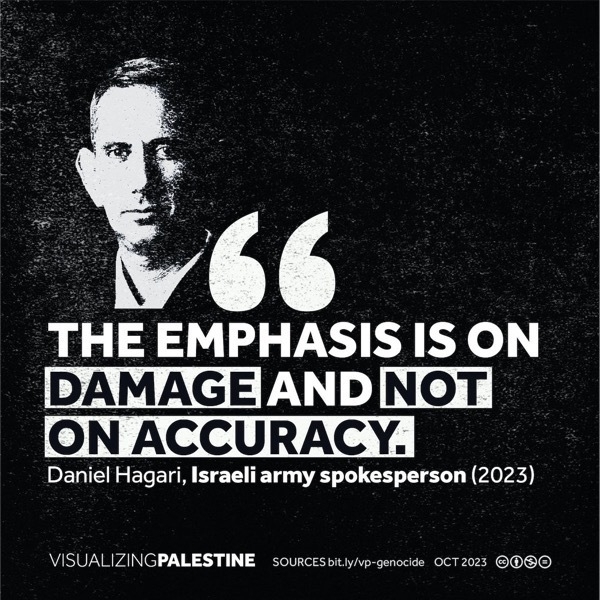
Can you see it yet? The Earth systems horizon – the point at which our planetary systems tip into a new equilibrium, hostile to most lifeforms? I think we can. The sudden acceleration of environmental crises we have seen this year, coupled with the strategic uselessness of powerful governments, rushes us towards the point of no return.